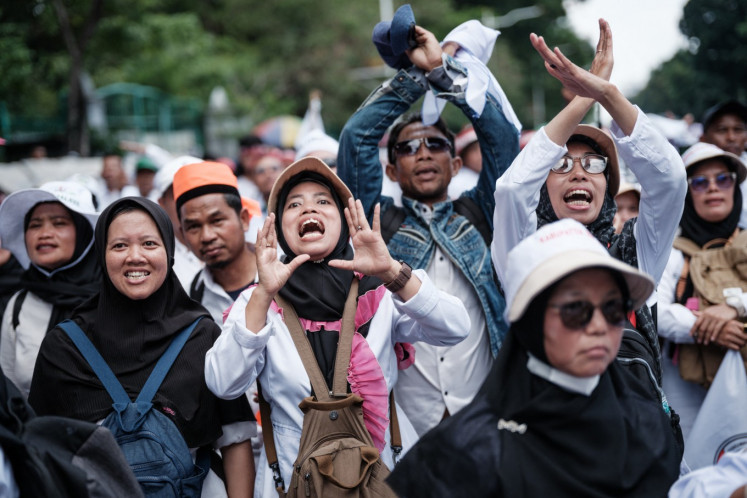Popular Reads
Top Results
Can't find what you're looking for?
View all search resultsPopular Reads
Top Results
Can't find what you're looking for?
View all search resultsMental health: The forgotten element in human development
As physical and sexual violence dominated the report, what is equally important but often unseen and forgotten is emotional and mental abuse in intimate relationships, leaving it untreated or often being ignored or undermined. However, the impacts on the victim are equally serious, even worse than scars or bruises.
Change text size
Gift Premium Articles
to Anyone
L
ast year, the Women's Empowerment and Child Protection Ministry revealed there were nearly 13,000 reported cases of violence toward women and children. Among them over 10,550 cases or 82 percent affected women and 73 percent happened in the private sphere. Intimate partners emerged as the leading perpetrators of violence against women with 1,528 cases, followed by biological fathers (425), uncles (322), stepfathers (205), and husbands (192), showing that violence and any form of abuse are already rampant before marriage. The annual report from the National Commission on Violence Against Women shows a consistent increase in incidences of violence against women since 2010 (105,105 cases) to 2018 (406,178).
As physical and sexual violence dominated the report, what is equally important but often unseen and forgotten is emotional and mental abuse in intimate relationships, leaving it untreated or often being ignored or undermined. However, the impacts on the victim are equally serious, even worse than scars or bruises. Emotional and mental abuse are often done covertly, such as manipulation, argument-twisting, blame shifting, victim-playing and gaslighting, or leading the victim to question her own sanity -- making it difficult to detect and thus accepted as something normal in society.
The root cause varies, but mostly come from common misperception of child-rearing and belief systems about oneself and others. Since they often go unnoticed and belittled, mental health awareness and education for public has never been this urgent.
Spreading the awareness and creating a safe space for the victims to speak out are necessary to break the cycle of its negative impacts, that are often multigenerational. Alas, efforts to help victims out of abusive relationships are still very few. The dominant patriarchal and shame culture makes it difficult and terrifying for victims – mostly women – to report. Most of the support is provided by private sectors or individuals. As people are still labelled as insane when they go to a psychologist, often the help takes form on online platforms. A good example would be from Regis Machdy, the founder of Pijar Psikologi, an online platform where victims or those struggling with mental health can share their story safely. As one who has overcome depression, Regis knows well how important a safe space is where people could share without afraid of being judged. The platform encourages survivors to speak up and support fellow sufferers of mental health problem or victims in abusive, unhealthy relationships.
The definition of health should be seen holistically. In fact, countries have begun to consider including non-economic measurement of development, such as Bhutan who adopted its Gross National Happiness since 2008. In July 2011, the United Nations General Assembly adopted resolution 65/309 on “Happiness: Towards a holistic approach to development” inviting member countries to measure the happiness of their people and to use the data to help guide public policy.
Therefore, the unnoticed and untreated pervasive mental health abuse does not only affect individuals but also hampers a country’s efforts towards gender equality, empowerment, and participation in development – since most victims are women. Individuals suffering from acute mental health would affect his or her work, even leading to suicide. In families, mental issues contribute to poor functioning families and lack of harmony.
Children cannot grow well in abusive family relations; instead they will adopt and internalize abusive values, and subconsciously repeat the same pattern in their future families. The long-term result is a society that tends to normalize abuse. Many crimes, juvenile delinquency, high divorce rate, child abandonment and domestic violence could be traced down to the lack of mental health care treatment.
To break the cycle and to increase awareness of mental health, the women’s empowerment ministry can collaborate with the Education and Culture Ministry to design a curriculum on mental health and insert it in the education system, beginning as early as the elementary stage.
The curriculum should address both potential victims and abusers, involving basic understanding about mental and emotional abuse, and preventive and curative actions when it occurs. The collaboration could facilitate the design of counselling programs for abusers and victims involving consultation with experts.
The government can also sponsor and strengthen research on mental health in Indonesia, its impact and contribution toward development, and later on begin to draft legislation addressing the issue, as it is outside the scope of the disability law. This should complement the proposed bill on elimination of sexual violence, as well as cultivate the seed of an anti-abuse generation and society that will extend support toward victims, instead of shaming them.
It is now time for us to pay more attention toward people’s mental health and consider it one of development indicators beyond economic performance.
***
The writer works for a foreign embassy in Jakarta. The above views are her own.











